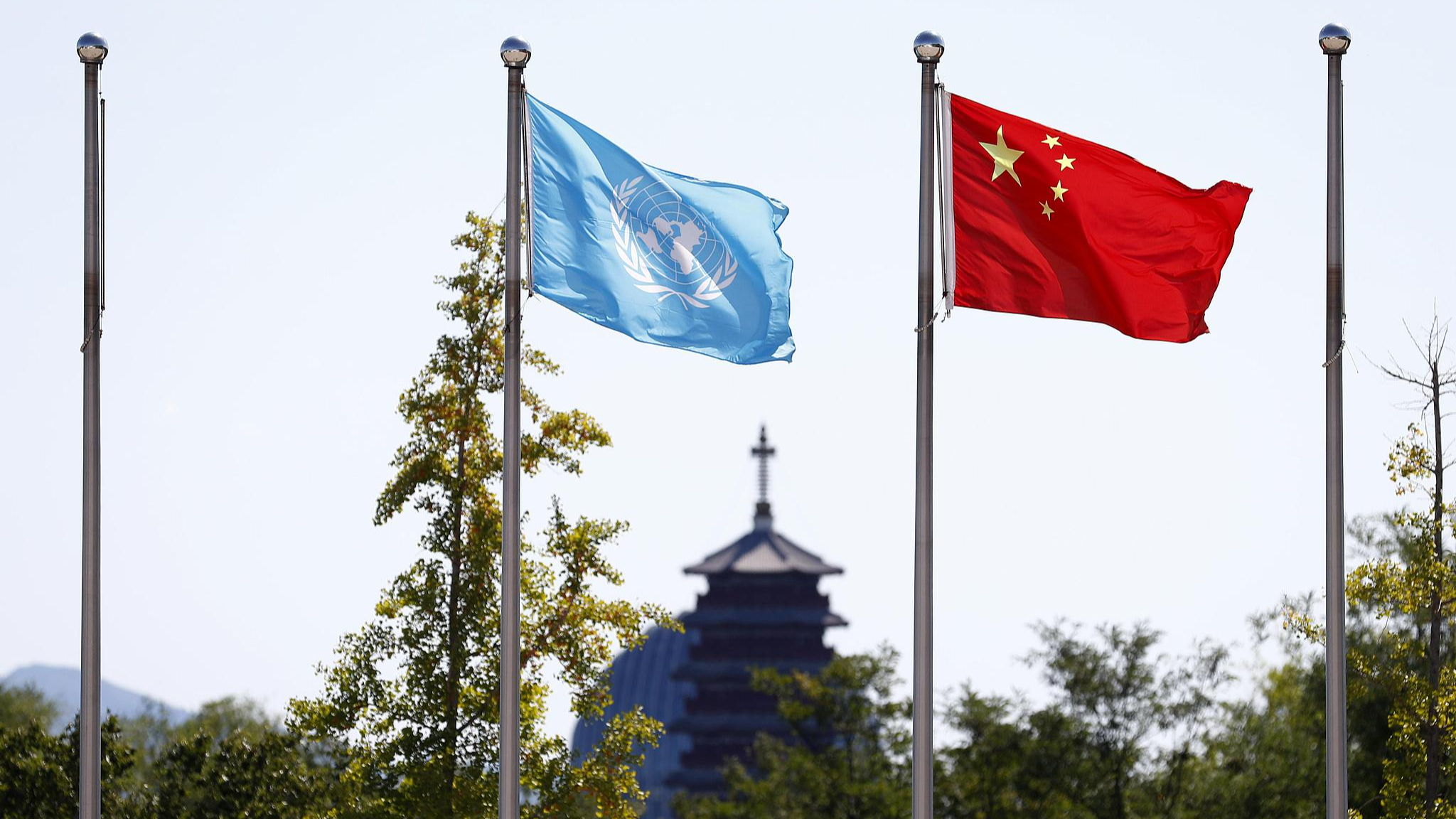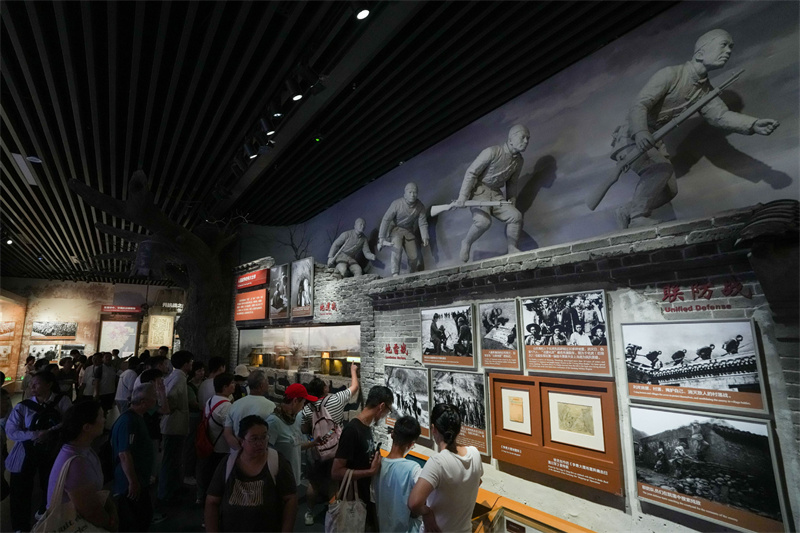
File photo of a UN flag and a national flag of China. /CFP
Editor's note: 2025 marks the 80th anniversary of the Chinese People's War of Resistance Against Japanese Aggression and the World Anti-Fascist War. To remember history, honor fallen heroes, cherish peace and create a better future, CGTN has launched the "Reframing the War: China's Strategic Role and Historical Reckoning" series. This is the eighth article in the series. Wu Wei, a special commentator on current affairs for CGTN, is a researcher at the Institute of Russian, East European and Central Asian Studies at the Chinese Academy of Social Sciences (CASS). The article reflects the author's views and not necessarily those of CGTN.
The 14-year Chinese People's War of Resistance Against Japanese Aggression was not only a harrowing ordeal of immense suffering and tragic sacrifice but also a defining historical watershed. It was at this pivotal juncture that the Chinese nation demonstrated an indomitable spirit and shouldered the responsibilities of a great nation, rising from devastation to renewal under extreme circumstances.
It is widely acknowledged that China was the first country to resist fascist aggression in World War Two. When Japan launched its invasion of Northeast China in 1931, Adolf Hitler and the Nazi Party had yet to seize power in Germany, and Benito Mussolini was still consolidating his regime in Italy while preparing for foreign expansion.
From the initial invasion of Northeast China to Japan's subsequent full-scale invasion of China, Japanese political and military circles consistently judged China to be fragmented and easily subdued. Despite its vast landmass, large population and rich natural resources, China at the time lagged far behind in all conventional measures of national strength, especially military capability. Internal turmoil, warlordism and fierce political struggles only widened the glaring disparity between China and Japan.
Although China attracted considerable sympathy from the international community, few believed it could endure. So the War of Resistance Against Japanese Aggression was exceptionally difficult and brutal, testing the limits of the nation's resilience and resolve.
What made the Chinese People's War of Resistance Against Japanese Aggression particularly challenging was not only China's limited resources but also the fact that it fought almost alone against an adversary of vastly superior strength. It is true that after the evacuation at Dunkirk, Britain experienced its own "darkest hour" of solitary resistance, and that the Soviet Union stood as a lone bulwark against Nazi Germany's ferocity at the outset of Operation Barbarossa. But Britain and the Soviet Union had much stronger industrial bases and military capacity; despite early setbacks, they could at least match their foes in sheer power. China's situation as a solitary combatant, however, was of an entirely different order.
Confronted with overwhelming disparity, China's 400 million people stood alone, draining Japan of its vast reserves of manpower, resources and financial strength. According to Japan's Ministry of Defense War History Series, prior to the outbreak of the Pacific War, approximately 78 percent – over 850,000 troops – of the Japanese Army's active ground forces were tied down in China. U.S. studies further reveal that even during the Pacific War, China continued to pin down 50 to 60 percent of Japan's army, amounting to around 600,000 to 1 million soldiers.
Although casualty estimates vary, scholarly consensus estimates that the Chinese front eliminated about 1.3 million Japanese troops. The war in China also consumed approximately 70 percent of Japan's total military spending – over 400 billion yen. These staggering figures were not the result of superior strength but of 14 years of determined resistance, paid for with the sacrifice of over 35 million Chinese people.
This, too, was an uneven yet radiant historical balance, illuminating the unyielding spirit of a united nation, unafraid of formidable foes and determined to survive with extraordinary valor.
The light illuminated China's path and destiny, the great rejuvenation of the Chinese nation and the broader course of world history. The international community, deeply moved by China's sacrifice and resilience, fully recognized its indispensable role in the global fight against fascism.
Joseph Stalin once remarked that it was China's resistance that pinned down Japan's forces, enabling the Soviet Union to redeploy 54 divisions from the Far East to defend Moscow. Without China's prolonged fight, Japan would have executed its plan to invade Siberia in 1941.
In 1944, U.S. President Franklin D. Roosevelt wrote to Chinese leaders: "The sacrifice of the Chinese people spared the United States from fighting a two-ocean war. China is the guardian of world civilization." Similarly, British Prime Minister Winston Churchill noted: "Had China collapsed, Japan's navy and army would have joined forces, severing all routes through the Indian Ocean and collapsing the British Empire's entire Asian defense line." He concluded that China's role in containing Japan's main forces was decisive.
While wartime leaders had not coined terms like "the Main Eastern Battlefield" or "the Fortress of the East," in the postwar balance of power China's weight was unmistakably elevated far beyond its prewar standing.

People visit an exhibition themed "For National Liberation and World Peace" at the Museum of the War of Chinese People's Resistance Against Japanese Aggression in Beijing, capital of China, July 8, 2025. /Xinhua
Let us turn to the pages of history and revisit key moments in China's ascent to the center of the world stage.
On October 30, 1943, China, the Soviet Union, the United States and the United Kingdom jointly issued the Declaration of Four Nations on General Security, later known as the Moscow Declaration. The declaration affirmed: "The Four Nations recognize the necessity of establishing at the earliest practicable date a general international organization, founded on the principle of sovereign equality of all peace-loving states, open to all such states, large and small alike, for the maintenance of international peace and security." This institution would eventually evolve into the United Nations.
Chinese delegate Fu Bingchang wrote in his diary: "My hand trembled as I signed. For the first time after the century of humiliation, China stands as an equal among the great powers." His signature was far more than a formality; it marked a turning point of profound national significance.
From November 23 to 26 of the same year, the leaders of China, the U.S. and the UK gathered in Cairo for a historic summit. The main topics of the Cairo Conference were the war against Japan and the postwar order in the Far East. The three countries demanded Japan's unconditional surrender and the return of all territories it had seized and occupied. Together, they laid the foundation for a new East Asian landscape. Standing alongside the heads of the U.S. and the UK, China's emergence as a principal power in World Anti-Fascist War became unmistakably clear to the international community.
During the founding of the United Nations, President Roosevelt declared, "China must be a permanent member of the Security Council; it is the cornerstone of postwar stability in Asia." The British Foreign Office observed: "Though China lacks sufficient national strength, its strategic importance makes its inclusion among the Big Five indispensable."
Rising to this historic responsibility, China played a substantive role in shaping the UN Charter – particularly in defining principles of national self-determination and refining the mechanism of the veto. On June 26, 1945, Chinese delegate Gu Weijun was the first to sign the Charter of the United Nations. Later that year, on October 24, as one of the 51 founding members, China formally assumed its place alongside the USSR, the U.S., the UK and France as a permanent member of the UNSC – the only Asian country in that body at the time.
From a nation once deemed the weaker side of a lopsided balance, China rose to secure its seat among the world's great powers. As a permanent member of the UNSC, it stepped into the international spotlight with a new image – confident, resilient and dignified.
The epic written by 400 million Chinese people was like the blaze of 400 million torches burning as one. Whether in darkness or in light, in that era or in the years to come, its flame endures – impassioned and unrelenting – inspiring the hearts of generations, amplifying their voices of pride and determination and propelling them ever onward.
(If you want to contribute and have specific expertise, please contact us at opinions@cgtn.com. Follow @thouse_opinions on X, formerly Twitter, to discover the latest commentaries in the CGTN Opinion Section.)
阅读原文:https://news.cgtn.com/news/2025-08-20/How-China-became-one-of-the-UNSC-s-5-permanent-members-from-ruins-1FKBrq7VkFq/p.html